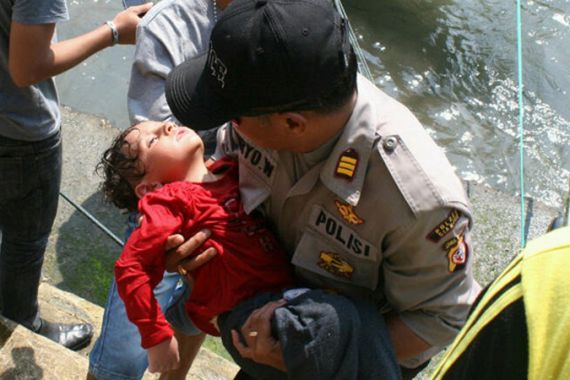Australia to probe migrant rape claims in PNG
Manus Island offshore-processing camp claims emerge as PM defends new Papua New Guinea policy in wake of boat tragedy.

Australia is to investigate reports that asylum seekers at one of its detention camps in Papua New Guinea are being raped and tortured.
Kevin Rudd, Australia’s prime minister, has said that no more boat-people will be allowed to resettle in Australia and unauthorised arrivals will be sent to camps in PNG, according to a new agreement between the two countries.
Rudd said on Wednesday that the sinking of a refugee boat off the coast of West Java, Indonesia, on Tuesday evening justified his new offshore-processing policy, denounced by human rights groups.
Officials said on Wednesday that at least 11 people, including children had died, and that 189 other suspected asylum seekers had been rescued. The search for survivors is continuing.
“This … sends a very clear message to people smugglers to stop sending people by boat to Australia,” Rudd told a news conference in Melbourne.
Suicide-attempt claims
A former senior official at the Manus Island processing centre in PNG has said that people have been raped and tortured at the facility.
Tony Burke, Australian Immigration Minister, described the claims of Rod St George, the former head of occupational health and safety at the centre, as “horrific” and arrived on Manus Island to investigate on Thursday. He said that any troublemakers would be removed from the camp.
Graeme McGregor, a refugee campaign co-ordinator for Amnesty International Australia, said that it was vital that the government immediately took steps to support the complainants of rape and torture at the camp, and for those accused to be arrested and charged “in a fair court of law”.
“There needs to be a full investigation into how this matter was handled in the camp,” McGregor told Al Jazeera.
St George told Australia’s SBS television that self-harm and attempted suicides occurred on an almost daily basis and that weapons were being accumulated in readiness for a break-out attempt.
Conditions for asylum-seekers on Manus Island are massively inapproriate
St George said the men who were sexually assaulted were sent back to the same tents as the people who raped them.
“There was nothing that could be done for these young men who were considered vulnerable, which in many cases is just a euphemism for men who are being raped,” he said.
Peter Charley, executive producer for SBS’s Dateline programme, which first aired the abuse allegations, said that journalists had been prevented from entering the facility.
“They’ve flagged very clearly that it’s not the Papua New Guineans who control it, even though it’s on their territory; it’s the Immigration Department in Australia that controls it,” Charley told Al Jazeera.
He said the revelations were important because Manus Island was the key processing point for migrants trying to reach Australia by boat.
“The boat-people, as we call them, have become a politcal issue,” he said.
McGregor told Al Jazeera that Amnesty had found that the Manus Island centre was already under-resourced before Rudd’s new policy pledge.
“Conditions for asylum seekers on Manus Island are massively inapproriate,” McGregor said.
The Immigration minister is also due to visit Australia’s other main processing camp on Nauru in the Pacific, which was rocked by riots that razed buildings on Saturday following Rudd’s announcement of the new policy.
Hundreds of people have drowned making the same journey to Australia.